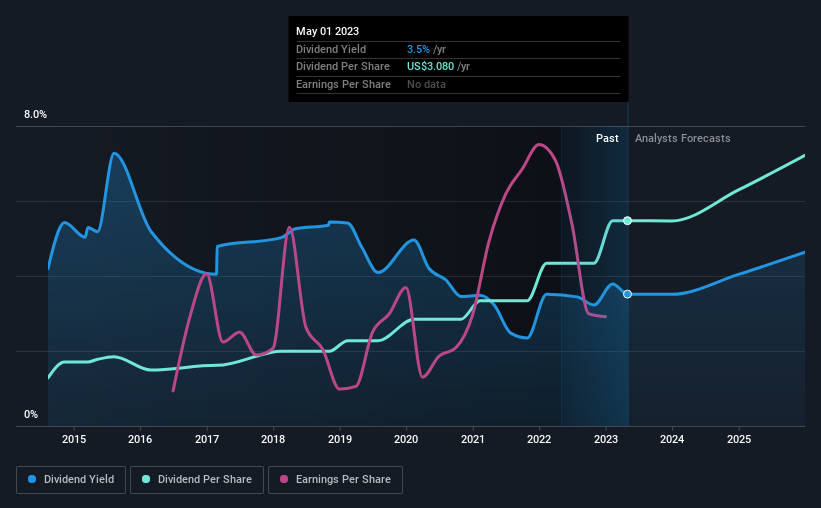- United States
- /
- Capital Markets
- /
- NYSE:ARES
Ares Management's (NYSE:ARES) Upcoming Dividend Will Be Larger Than Last Year's

The board of Ares Management Corporation (NYSE:ARES) has announced that it will be paying its dividend of $0.77 on the 30th of June, an increased payment from last year's comparable dividend. This will take the dividend yield to an attractive 3.5%, providing a nice boost to shareholder returns.
See our latest analysis for Ares Management
Ares Management's Payment Has Solid Earnings Coverage
Impressive dividend yields are good, but this doesn't matter much if the payments can't be sustained. Prior to this announcement, the dividend made up 279% of earnings, and the company was generating negative free cash flows. This high of a dividend payment could start to put pressure on the balance sheet in the future.
Looking forward, earnings per share is forecast to rise exponentially over the next year. If recent patterns in the dividend continue, we could see the payout ratio reaching 52% which is fairly sustainable.

Ares Management's Dividend Has Lacked Consistency
It's comforting to see that Ares Management has been paying a dividend for a number of years now, however it has been cut at least once in that time. This suggests that the dividend might not be the most reliable. The dividend has gone from an annual total of $0.72 in 2014 to the most recent total annual payment of $3.08. This works out to be a compound annual growth rate (CAGR) of approximately 18% a year over that time. It is great to see strong growth in the dividend payments, but cuts are concerning as it may indicate the payout policy is too ambitious.
Ares Management May Have Challenges Growing The Dividend
Growing earnings per share could be a mitigating factor when considering the past fluctuations in the dividend. Ares Management has seen EPS rising for the last five years, at 6.3% per annum. However, the payout ratio is very high, not leaving much room for growth of the dividend in the future.
Ares Management's Dividend Doesn't Look Sustainable
Overall, we always like to see the dividend being raised, but we don't think Ares Management will make a great income stock. The payments are bit high to be considered sustainable, and the track record isn't the best. Overall, we don't think this company has the makings of a good income stock.
Companies possessing a stable dividend policy will likely enjoy greater investor interest than those suffering from a more inconsistent approach. Still, investors need to consider a host of other factors, apart from dividend payments, when analysing a company. For example, we've identified 5 warning signs for Ares Management (2 are significant!) that you should be aware of before investing. Is Ares Management not quite the opportunity you were looking for? Why not check out our selection of top dividend stocks.
New: Manage All Your Stock Portfolios in One Place
We've created the ultimate portfolio companion for stock investors, and it's free.
• Connect an unlimited number of Portfolios and see your total in one currency
• Be alerted to new Warning Signs or Risks via email or mobile
• Track the Fair Value of your stocks
Have feedback on this article? Concerned about the content? Get in touch with us directly. Alternatively, email editorial-team (at) simplywallst.com.
This article by Simply Wall St is general in nature. We provide commentary based on historical data and analyst forecasts only using an unbiased methodology and our articles are not intended to be financial advice. It does not constitute a recommendation to buy or sell any stock, and does not take account of your objectives, or your financial situation. We aim to bring you long-term focused analysis driven by fundamental data. Note that our analysis may not factor in the latest price-sensitive company announcements or qualitative material. Simply Wall St has no position in any stocks mentioned.
About NYSE:ARES
Ares Management
Operates as an alternative asset manager in the United States, Europe, and Asia.
High growth potential slight.
Similar Companies
Market Insights
Community Narratives



